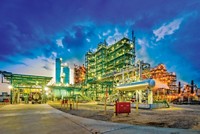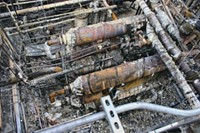Advertisement
Grab your lab coat. Let's get started
Welcome!
Welcome!
Create an account below to get 6 C&EN articles per month, receive newsletters and more - all free.
It seems this is your first time logging in online. Please enter the following information to continue.
As an ACS member you automatically get access to this site. All we need is few more details to create your reading experience.
Not you? Sign in with a different account.
Not you? Sign in with a different account.
ERROR 1
ERROR 1
ERROR 2
ERROR 2
ERROR 2
ERROR 2
ERROR 2
Password and Confirm password must match.
If you have an ACS member number, please enter it here so we can link this account to your membership. (optional)
ERROR 2
ACS values your privacy. By submitting your information, you are gaining access to C&EN and subscribing to our weekly newsletter. We use the information you provide to make your reading experience better, and we will never sell your data to third party members.
Safety
Runaway Reaction Leads to Toxic Release, Chemical Board Says
November 22, 2004
| A version of this story appeared in
Volume 82, Issue 47
A chemical company's inability to control a chemical reaction and an erroneous accident emergency plan led to injuries of 17 police and ambulance personnel and the evacuation of more than 100 homes and businesses, says the Chemical Safety & Hazard Investigation Board in a draft accident report concerning MFG Chemical Inc., Dalton, Ga. Released last week, the report says a cloud of toxic allyl alcohol and possibly hydrogen chloride was released in April when a safety device on a 2,000-gal chemical reactor burst while the company's first production-scale batch of triallyl cyanurate was being processed. Board investigators say MFG was unable to control heat generated in the process, and that caused the runaway reaction. However, the board also says the company's emergency plan focused only on allyl alcohol's flammability and not its toxicity. As a result, MFG was not equipped to handle the toxic release and failed to communicate the release's toxicity to emergency responders and the community. Responders, the report says, lacked protective equipment and had no monitoring devices to detect airborne toxicity. They were forced to withdraw, as were ambulance crews who were also unaware of the toxicity and were sickened and unable to treat or remove victims. The accident is the latest in a string of incidents caused by uncontrolled chemical reactions, says the board, which is currently investigating seven similar accidents. A final report on the MFG incident is expected in the spring.





Join the conversation
Contact the reporter
Submit a Letter to the Editor for publication
Engage with us on Twitter